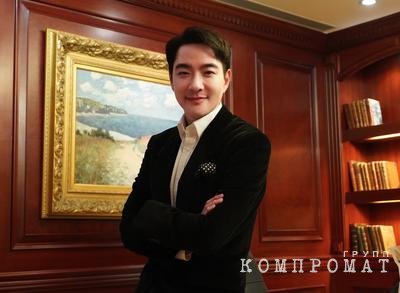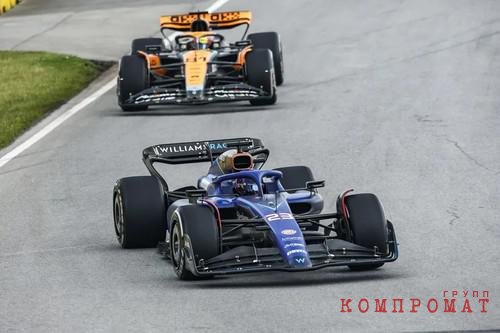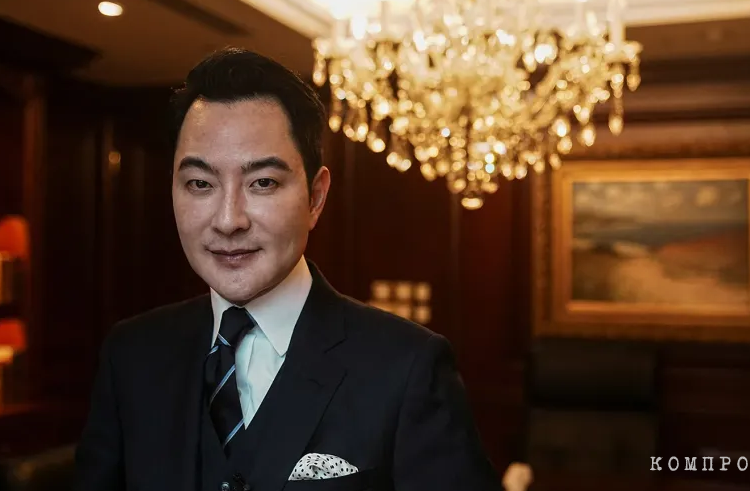Millionaires add zeros to themselves
Calvin Lo desperately tried for years to pass himself off as a billionaire traveller, financier and part-time philanthropist, owner of a world-class champagne collection, homes on three continents, a fleet of exotic supercars, and shares in a five-star hotel and Formula One team. The story is simply fascinating – it’s just a pity that (mostly) fictional.
 Calvin Lo
Calvin LoOn a warm September morning in 2022, Calvin Lo received a visitor at the Hong Kong office of his family life insurance brokerage, RE Lee International, an editor from Forbes USA. Dressed immaculately in a three-piece suit with a matching tie and pocket square, Lo invited the editor into a meeting room—the walls were lavishly paneled, leather-bound books were everywhere, and the room itself was tastefully furnished with vases.
The man invited the editor of Forbes USA to his place to discuss the rating of world billionaires according to the magazine. Lo, CEO of RE Lee International, said he was “curious to know” how other Asian billionaires are on the list. He explained that he was faced with a “dilemma”: whether it is necessary to provide the editors of Forbes USA with additional documents on their finances in order to enter the list. In his opinion, older and more conservative tycoons tend to maintain confidentiality, but wealthy people in the second and third generations are more open, moreover, some acquaintances urged him to join the lists of the richest. In addition, Lo noted that inclusion in the coveted rating would greatly benefit his core business, which is selling insurance policies to ultra-high-net-worth individuals.
In reality, Law’s “dilemma” was a staging. By the time of that meeting, he had already been trying to fraudulently break into the list of the richest people in the world for more than two years. Since 2020, 11 different Forbes USA reporters have been approached by at least seven people on more than 20 occasions.
They all passed him off as “the most secretive billionaire philanthropist” and “the most reclusive and elusive billionaire investor in the world.” The editors received more than a dozen documents allegedly confirming Law’s reputation and condition – some even had the stamps “Private and confidential.”
Initially, Forbes USA did not take these appeals seriously. Every year, a huge number of impostors try to get into the list of billionaires, and at first glance, Law simply did not seem rich enough. In Hong Kong, Forbes USA maintains a six-person editorial office, and RE Lee International is not widely known in the city, and the fact that the business makes billions in reselling insurance policies seemed far-fetched.
But the flow of appeals did not dry out, and over time, materials in which Lo was awarded the title of billionaire began to appear in many publications like BBC, CNBC, Daily Express, Daily Mirror, Financial Times, Independent, Nikkei Asia, Reuters And South China Morning Post, – The media talked about his views on everything from champagne to cryptocurrencies. Many of the articles cited Forbes USA as the source, and one of Lo’s publicists sent out emails stating that the entrepreneur was on the magazine’s list of billionaires. The website of Forbes Middle East, one of the independent licensed editorial publications, even published an article calling Lo a billionaire. Investigation revealed that the article was paid “promotional material” by Lo’s team, and it was then removed. The entrepreneur has never been a participant in the ranking of the richest people in the world, and it is high time to dot the “i”.
The first meeting in Hong Kong turned into an investigation lasting almost a year, during which time Forbes USA managed to talk to at least 40 people in six countries and read hundreds of pages of documents, carefully separating facts from Lo’s biography (there were very few of them) from his own. fiction (everything else).
Nam Lo was introduced as the CEO and owner of RE Lee International, “the world’s largest life insurance broker” with about $1 billion in profits, and the founder of RE Lee Capital, which manages $8-10 billion in assets (depending on press release). ). The businessman has been described as a Harvard-educated investor who in 2018, through his own investment fund RE Lee Octagon, paid $1.2 billion to buy the five-star Mandarin Oriental Hotel in Taipei, Taiwan; a philanthropist who established a $250 million charitable foundation; owner of almost a dozen homes around the world. He was also said to be “Asia’s largest investor and champagne collector and one of the first owners of a Gulfstream G650 private jet.” Oh yes, he was also an investor in the legendary Williams racing team in Formula 1.
Most of this information could not be confirmed. Others were outright lies. The man does not have shares in the Formula 1 racing team. Mandarin Oriental in Taipei does not belong to him. The houses he gave addresses are either owned by his parents or by other people. In the database of the Harvard Business School, a graduate named Calvin Lo was not found. Apparently, there is not even a RE Lee Octagon charitable foundation, and RE Lee Capital explained that although Lo is actually the son of an independent investor in the firm, involvement in the business of his mother, Regina Lee (who is chairman of the board of directors) “cannot be misinterpreted as a link between Mr. Luo and our company.” RE Lee Capital also confirmed that the organization does not have nearly $8-10 billion of funds under management, allegedly.
 Calvin Lo claims to be an investor in the legendary Williams Formula One racing club, likely through team owner Dorilton Capital, but sources say neither the investment fund nor Williams have ever heard of such a thing.
Calvin Lo claims to be an investor in the legendary Williams Formula One racing club, likely through team owner Dorilton Capital, but sources say neither the investment fund nor Williams have ever heard of such a thing.As for Lo RE Lee International’s insurance business, one former high-ranking official believes that the organization simply could not issue insurance policies for $ 800 million (nominal value) last year. The company is worth about $60 million, according to Forbes USA. It is much more difficult to determine who controls it. Luo’s mother bought out the business she helped build in 2015. She may have passed the business on to her son. Regina Lee and Francis Lo, Calvin’s father, own at least two apartments in Victoria Peak, Hong Kong’s most prestigious residential area, RE Lee International’s 376 sq. m in the business center of the same Hong Kong and a condominium in Vancouver. There is no doubt that his family is wealthy, but they are not as rich as Calvin assures. The combined fortune of Lo and his parents does not exceed $200 million. Lo and his mother Forbes USA sent an impressive list of questions and waited for an answer. As a result, a letter came from a law firm with the following words: “All insinuations that our client is dishonest, lying and behaving unethically, he categorically rejects.”
He is far from the first person to exaggerate the size of his fortune to Forbes USA. Famous storytellers of the financial genre include Donald Trump, former U.S. Secretary of Commerce Wilbur Ross, and reality TV star and cosmetics entrepreneur Kylie Jenner. Others go out of their way to make a good impression. So, 10 years ago, the prince of Saudi Arabia Al-Waleed ibn Talal sent the editors of Forbes USA green leather bags weighing at least 4.5 kg, stuffed with fake “reprints” of magazine covers, including a photo in a triumphant pose allegedly for Vanity Fair and two fake covers of Time’s 100 most influential people. There was even a “reprint” of Forbes USA, from the “cover” of which a man casts a look full of confidence, dressed in a black turtleneck a la Steve Jobs, and at the bottom is the inscription “The most cunning businessman in the world.” None of those magazines were real.
But even in such a company, Law stands out for the courage of his statements and the desperation of his attempts to achieve what he wants. This includes not only the involvement of marketing agencies and a whole team of lawyers who will confirm his lies, but also the likely falsification of financial statements and the forgery of a photograph. And although many tell the editors that their wealth is greater than it really is, as a rule, they do not pretend to be the owners of other people’s assets.
As to why Luo even undertook to exaggerate his condition, he gave a hint in September last year: “If I were looking for someone who would provide [финансовые] services, I would like this person to be successful.”
The origins of the Hong Kong business are on the other side of the Pacific Ocean, in Seattle. Here, an American entrepreneur named Robert Earl Lee started the firm that would become RE Lee International. Lee entered the insurance industry in 1954 and over time began to open and buy out insurance agencies in the western United States and Asia. At some point, the manager hired Regina Lee (they were not relatives), Lo’s mother subsequently became one of the first in Asia to sell life insurance policies to super-rich clients.
Calvin Lo, the only child of Regina and Francis, was born in Vancouver but grew up in Hong Kong for the first nine years of his life before returning to Canada. There he entered Queens University in Kingston, Ontario. In 1999, he flew back to Hong Kong and began working with his mother at RE Lee International, where he became Managing Director in 2003 and later CEO.
At some point, Regina decided to finance her son’s chic lifestyle. According to the court, which in 2014 considered the case of his divorce from his wife Emily (he married her in 2006), the couple spent much more than they earned, and Law had to borrow money from Regina. “His mother manipulated him to get him into a first-rate investment company and provide him with a lifestyle that he definitely could not afford on his salary,” the judge concluded. According to records, in 2004 Regina gave Calvin about $308,000 to buy a Lamborghini, and in 2005 she gave Calvin about $1.2 million to furnish an apartment in Singapore. His mother even paid him an expensive wardrobe. The judge ruled that Law’s net worth at the time was about $3.6 million – not billions.
The scandalous divorce proceedings were exemplary for entirely different reasons. Emily, who died of cancer in 2020 at the age of 40, pointed out that Calvin was completely untrustworthy. The woman accused him of lying about his education, work experience and even his own age. Forbes USA reached out to Emily’s family for comment, but they declined to comment. The judge criticized the woman for giving “peripheral information” and stressed that Lo showed his identity card and passport, which states that the man was born in 1977, to prove his age. But not everything is so simple. Court filings put his date of birth in October 1977, making the man 45. However, recent promotional materials indicate he is 46, although a 2013 report from the Jane Goodall Institute, on whose board Law briefly met, his date of birth is marked in 1971 – that is, it turns out that he is 52.
Among other things, Forbes USA found a bunch of contradictions. We have found evidence that Lo actually graduated from Queens University in 1999, as he himself claims, but we could not confirm his words about studying at Harvard Business School. Searches through the National Student Information Service, which verifies degrees, and the Harvard alumni database turned up nothing. Harvard University also said that there is no record of a Harvard Business School degree holder in that name. Representatives of the management education program at the Harvard Business School said they could not check the database without Lo’s personal permission. His late ex-wife and one former employee said the man’s diploma was fake.
At a meeting with Forbes USA in February of this year, the entrepreneur said that in the past he worked at Sun Life Financial in Boston and JPMorgan in New York. The latter confirmed that in 2001-2002, Lo was briefly an employee in the investment division of the bank, but Sun Life Financial, which implements insurance programs through Lo’s company, did not find any documents about his work.
In 2015, Robert Lee died, and Regina bought out from his family a share of the business, which she did not yet own. The woman moved the headquarters of RE Lee International from Seattle to Hong Kong and, quite likely, transferred the entire organization to her son Calvin.
But many of his other assets are pure fantasy. A spokesman for Kai Tai Fung International, the owner of Taipei’s Mandarin Oriental, told Forbes USA that negotiations with Lo were held in 2019, but the deal ultimately fell through: “To date, there have been no offers to buy Mandarin Oriental’s business in Taipei.”
At the same meeting in February, Law specifically noted that he holds a stake in the Williams Formula 1 team, having invested $100 million in Dorilton Capital, a venture capital fund that owns the club. “I’ll tell you a secret, there were a huge number of non-disclosure agreements, but I definitely own a stake in them,” the businessman shared with us. “I can’t say too much.” A source in the racing team claims that no one even heard the name Lo, and a person familiar with the course of affairs at Dorilton Capital claims that the Hong Kong entrepreneur has never invested in either the fund itself or Williams.
At first, Lo told Forbes USA that he had homes in six cities – Hong Kong, Singapore, Tokyo, London, Vancouver and Los Angeles – but after persistent inquiries, he reduced the number to five. Then the businessman provided the addresses of four properties in Hong Kong and one in Singapore, but upon checking the official registry records and additional inquiries, it turned out that two of the houses belonged to his parents, and the rest to other people.
It is strange that, as a Canadian citizen and a resident of Hong Kong, Lo attracted firms from Thailand to confirm his wealth. When asked why Thai, he replied that these lawyers already had access to his financial documents, since he was negotiating one unnamed deal in Thailand. Two such organizations sent letters confirming Lo’s billion-dollar fortune to Forbes USA in March 2020 and March 2021. The other two showed up last spring, claiming that Lo was even richer.









